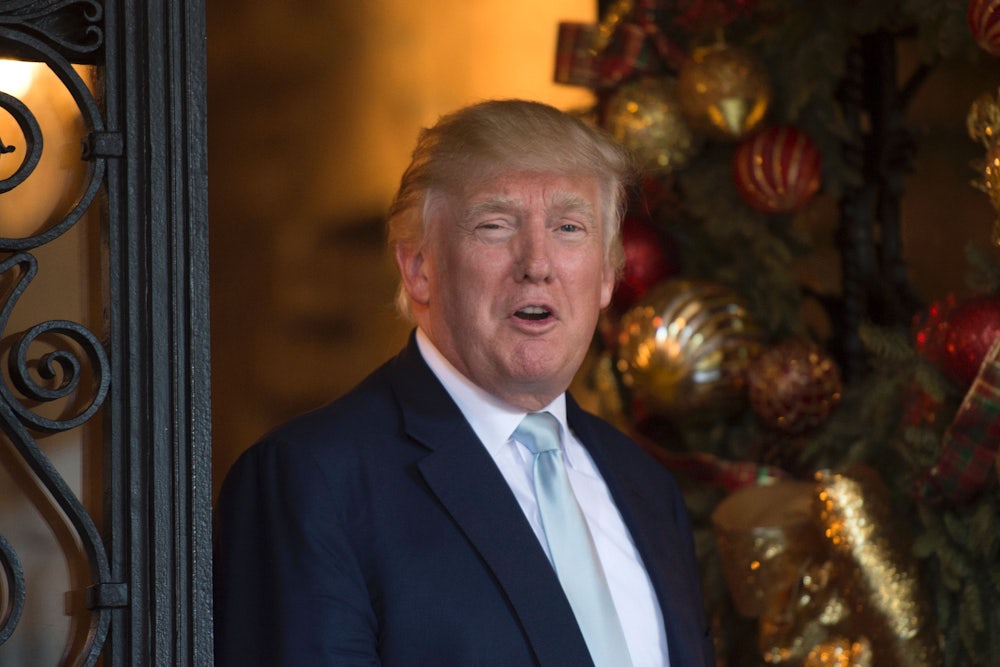Over the last week, President-elect Donald Trump has taken to Twitter to attack President Barack Obama in increasingly strident terms, and also made a sideswipe at the United Nations for passing a resolution against Israel’s building of settlements in the occupied territories. “The United Nations has such great potential but right now it is just a club for people to get together, talk and have a good time,” Trump tweeted on Monday. “So sad!” On Wednesday morning he tweeted, “Doing my best to disregard the many inflammatory President O statements and roadblocks. Thought it was going to be a smooth transition - NOT!”
While these tweets, with their simplemindedness and touchiness, call out for psychological analysis, they also ofter a frightening portent of Trump’s government. As has often been observed, it is hard to know exactly what policies Trump will adopt, since he often changes his mind or offers contradictory promises. Still, he does have defined inclinations and behavioral tics, which are unlikely to change.
First of all, Trump’s tweets and other ad hoc comments make clear that we can dispense with the various theories that he will be a puppet to some behind-the-throne schemer, whether it be Vice President–elect Mike Pence, House Speaker Paul Ryan, chief White House strategist Steve Bannon, Jared Kushner, or Ivanka Trump. The voice in the tweets, which will by necessity be setting presidential policy, is the same old Trump we’ve known for many years. If there were a shrewd puppet master pulling the strings, they might make Trump temper his language or take away his phone for awhile. But Trump is clearly in charge.
Second, although there might not be a puppet master, the attack on the U.N. does show it’s possible for those around Trump to channel his natural inclinations in their preferred direction. His instincts are anti-institutional and unilateralist: He doesn’t trust organizations and wants to go his own way as much as possible. During the primaries, that came through in his jibes against NATO and trade agreements. Even now, Trump’s tweet against the U.N. is mild compared to his many other insults.
What makes Trump’s U.N. tweet interesting is that it fuses his own unilateralist inclinations with the policies of his party. Republicans in the Senate are equally angry at the U.N. and are preparing ways to punish the institution, possibly by limiting funding. Former Senator Rick Santorum told The Washington Post that “the focus will come off NATO and will move squarely onto the U.N.” The implication here is that Trump has a certain store of natural belligerence and the key is to get it focused on the right target.
Third, that Trump is staking out strong foreign policy positions in direct contradiction to the current president is proof that Trump’s norm-breaking did not end with his election. As Benjy Sarlin noted at NBC News, “President-elect Donald Trump’s running commentary on sensitive foreign policy issues before taking office is ruffling feathers, with critics complaining he’s violating a longstanding tradition of deference to the incumbent White House during transitions.” Aside from the U.N. vote, Trump has spoken out against America’s “one-China” policy, the intelligence community’s claims about Russian hacking, and the opening to Cuba.
Trump’s violation of the “one president at a time” rule is both a challenge and an opportunity for the Democrats as an opposition party. So far, the general response by Trump’s critics to his norm-violations has been verbal, amounting to little more than ineffectual tut-tutting. The question Democrats will have to answer is: Do the old rules still apply, or will they have to break a few norms themselves?
House Speaker Paul Ryan seems to be aware that Democrats might up the ante with civil disobedience on the floor Congress, as they have infrequently in the past. Thus, he’s taking the preemptive step of pushing to ban live-streaming via private phones in the Congress, to prevent theatrical displays of opposition.
Obama also has to decide whether to respect traditions or answer Trump’s norm violations. In an interview with former campaign manager David Axelrod, Obama suggested that there might be tensions between the traditional role played by former presidents and what might be required in the age of Trump. Reflecting on these tensions, Obama said:
I — by virtue of the Constitution and because I believe in the wisdom that George Washington showed, that at a certain point, you make room for — for new voices and fresh legs.Now, that doesn’t mean that if a year from now or a year and a half from now or two years from now, there is an issue of such moment, such import, that — that isn’t just a debate about a particular tax bill or, you know, a particular policy but goes to some foundational issues about our democracy that I might not weigh in. You know, I’m still a citizen and — and that carries with it duties and obligations.
It would be a major break from norms going back decades if Obama re-entered politics and challenged Trump on policy. And in many ways Obama, who has such strong institutionalist instincts, might be the least likely ex-president to take such a step. Yet the election of Trump has brought the country to a scary new place, with a president-elect who has already given ample evidence that he will radically change settled rules. Given the new era, both Obama and his party will discover that it’s not enough just to decry norm-breaking, and might be necessary to break a few norms themselves.
